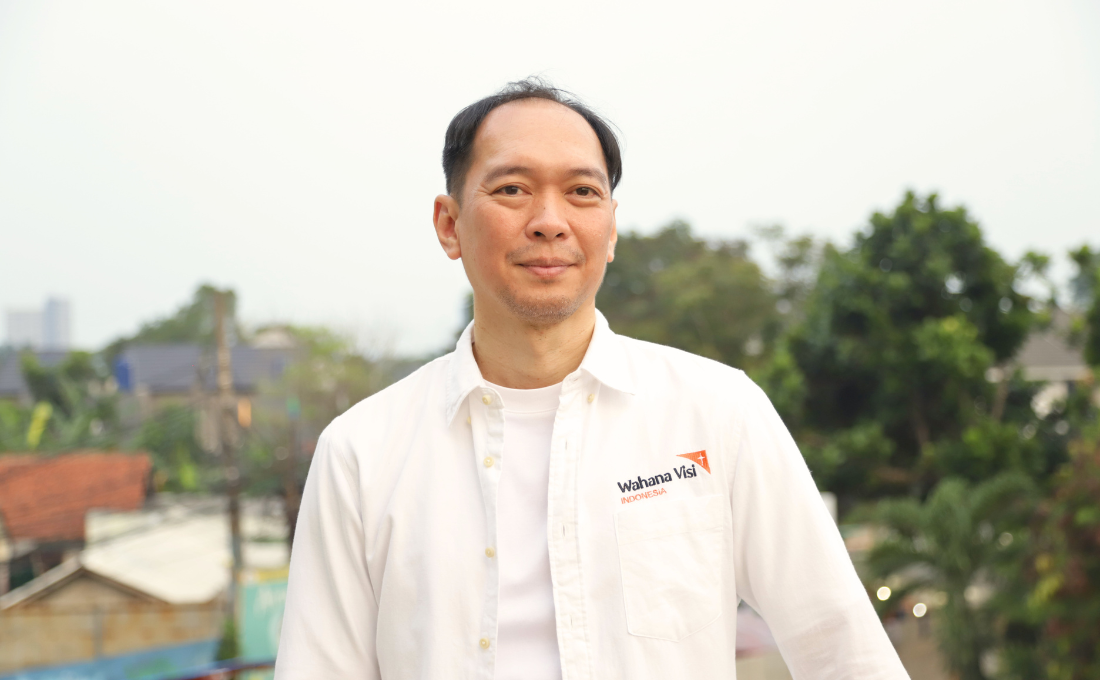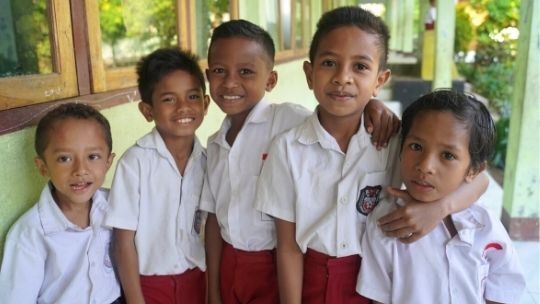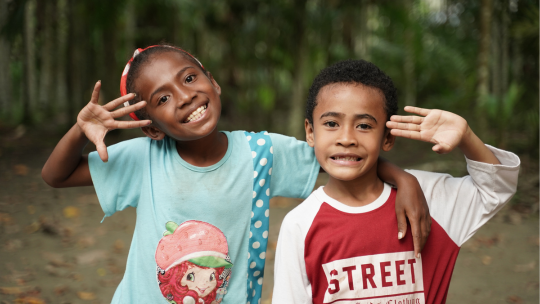Candra Wijaya: Learning Health, Strategy, and Fruitful Life in WVI

Fear is a natural reaction when faced with a challenge, whether in our personal lives or at work. It's important to remember that challenges are inevitable, and they exist not only as risks, but also opportunities to help us grow. If we view challenges as mere risks, fear might lead us to avoid them. However, if we see them as opportunities, we will embrace them, even if we're afraid. Of course,iIt's best to approach challenges with a strategy for adapting and mitigate the risks.
"Whenever I'm given a new responsibility, especially one that's outside my main area of expertise, it becomes a source of fear. I am worry about not knowing how to do it, lacking the knowledge or experience," says Candra Wijaya, currently the Strategy, Risk, Innovation and Evidence Director at Wahana Visi Indonesia. Having built a 19-year career in the humanitarian sector and risen to a leadership position at WVI, Candra has faced many challenges as his responsibilities have changed. As a human being, he often experiences fear and anxiety, but he has learned to embrace each challenge as an opportunity to learn new things.
"I've come to understand that there's always a first time for everything. And that's an opportunity for us to learn. To learn quickly and master whatever task is assigned to us. Then to try our best to fulfil that responsibility," says Candra, who is also a doctor.
Challenges often signal potential. When leaders in an organisation or company delegate a challenge to staff, it means they see potential that the staff may not be aware of. It would be a shame if the staff's potential goes untapped because they're unwilling to face the challenge.
"It's okay to be shocked by a new challenge, but don't dwell on it. Quickly find a way to gain knowledge, to learn. Learn while you work. Be a lifelong learner to reveal the best version of yourself. Don't let your work result become a burden to others instead of helping them due to our shortcoming in mastering the works entrusted to us," says Candra.
Learning from Challenges, Challenges for Learning
Before joining Wahana Visi Indonesia, Candra was a general practitioner who graduated from the Faculty of Medicine at the University of Indonesia. He had served as the head of several community health centres in South Lampung for six years while opening practice to serve people in need.
Becoming a doctor was the late Candra's father's wish. "My father believed that if I became a doctor, I could contribute my knowledge and be useful to others even if there were no other people or institutions that employed me," says the fourth of five children.
His encounter with the humanitarian world came through a fellowship friend during his university days. At that time, Candra was just learning that there were other career paths besides working as private practitioner or in government agencies, namely, non-profit or non-governmental organisations. Humanitarian work attracted him because it had the same mission as the medical profession: to be useful to others. "My heart was drawn to WVI, starting in 2006. I began my new journey in the humanitarian world through WVI," he says.
The first challenge came right at the beginning of Candra's career as a humanitarian worker. His initial role was as a Program Officer. "At the time, I didn't know what that role entailed. For a year, I spent my time asking questions to other staff who had been there longer. But because the scope of work of a Program Officer was varied, covering health, education, child protection, economics, disaster management, and many more, I learned a lot about WVI's humanitarian work through this position. I was able to see the connection between health issues with other cross-cutting issues," he recalls.
Not long after serving as Program Officer, Candra was entrusted with a new responsibility as a Health Team Leader. He likened this challenge to a fish returning to water, although in a different pond.
The role of Health Team Leader brought its own challenges. Although he was in the health sector, there was a difference in perspective. The knowledge he had as a medical doctor met the cross-road with the public health perspective, which was more closely aligned with humanitarian work. "I found the world of public health very interesting. Most people know that doctors are just medical professionals. They become specialist, treat patients, and have private practices or work in hospitals. However, there's another world for medical graduates, namely public health, which delves deeper into the promotion and prevention of diseases," he says. For Candra, the career shift from a doctor to a public health worker made him grow into a health care professional with a social perspective.
Over nearly nine years, Candra deep dived into various approaches to health programmes, both those initiated by WVI and the Government. The knowledge he gained from his Master's degree in Epidemiology, combined with his experience working with children and communities assisted by WVI, proved to be an effective strategy for embracing and overcoming challenges.
This role also gave Candra the opportunity to witness the transformation of children and communities. "Seeing firsthand how transformation happens brings joy. Especially the changes in key figures in the community who have a positive impact on children," says the father of three. "I'm happy when I see mothers, Posyandu cadres, health workers, or religious leaders say 'Oh, so it can be like this' or 'Oh, that's how it is'. These 'Oh' moments mean that they've gone from not knowing to knowing, and that makes what I share very meaningful."
One of the significant milestones in Candra's career as a Health Team Leader was when he met Pak Yali, a change agent from the Central Mountains of Papua. Sanitation issues were one of the root causes of the poor quality of life for children and communities in WVI's supported villages in the area. Candra and other WVI team were trying to contextualize implementation of the Community-Based Total Sanitation (CBTS) module promoted by the Government. "The challenge was that we couldn't directly apply the national module to the region. We had to first understand the context and determine the most appropriate approach so that the main message was understood in a language and manner that was suitable for the people," he says.
The dynamics of knowledge transfer with local wisdom occurred when Candra and his team testing the triggering approach of behavior change among community to stop open defecation in the Central Mountains in Papua. "In the context of Papua, religious leaders are listened to and respected by the community. I witnessed firsthand how religious leaders who have been enlighten about sanitation in villages and its impact to child health could encourage the community to commit to practice cleaner and healthier lifestyles as responsibilities to protect the nature and strive for the health and safety of others," Candra explains.
In addition to partnering with religious leaders, Candra and the WVI team partneredalso engaged with community leaders, including Mr. Yali. "Mr. Yali was someone who was passionate about developing his village. After he learned about the importance of Open Defecation Free (ODF), he commited to encourage the community in the village to stop open defecation. However, then came the challange on how to build toilets, using what materials, because cement and building materials were very expensive in Papua at the time," says Candra. This was the beginning of a clean and healthy living movement in the Central Mountains, when Mr. Yali, Candra, and other WVI team members discovered a local alternative to cement that could be used to build toilets. The material was found in every kitchen in every village in the Central Mountains: ash from burning firewood, which has been processed into cement by the community to make stove rings on the ground in the kitchen. It turns out that this locally made cement can be used to build toilets.
This discovery became an innovation that brought significant change to the lives of children and communities in Papua, and Candra was one of the witnesses. The insight and curiosity he possessed not only benefited himself but also transformed the lives of the most vulnerable children and communities. The capacities that can turn into a positive impact on others is one of the sources of joy and motivation for Candra to this day.
Candra's career continued with the next challenge. He was once assigned as Advocacy Director before assuming his current role as Strategy, Risk, Innovation, and Evidence Director. Becoming a leader who thinks about strategy, risk, innovation, and organisational governance was a significant challenge for Candra. Feelings of fear and doubt resurfaced. "I remember telling the National Director of WVI at the time, Pak Ote, that I only knew about trading strategies in the market. Because my late father with his sisters had a shop where I used to help after school hours. I knew strategy on how to serve customers and arrange goods in a shop, but not the strategy for humanitarian program, such as at WVI," he said, smiling as he recalled the moment.
He embraced this challenge and immediately made plans to continue learning. Candra furthered his knowledge by pursuing postgraduate studies in Strategic Management at PPM School of Management so that he can run the responsibility professionally with proper knowledge. Working with WVI made Candra become a dediacated lifelong learner who made an impact on others.
Learning in the School of Life
After embracing many challenges and witnessing numerous changes in children and communities, Candra sees that WVI as a school of life. A humanitarian organisation that can be a channel for Candra to share life with others. "When there's a calling in the heart, a calling to serve and share life with others, WVI can accommodate that," he says.
With a wide range of assisted areas and diverse sectoral interventions, Candra has been able to grow into a person who is flexible in dealing with various human characters and various issues in society. "WVI is one of the vehicles I've ridden to achieve my main life goals, which are to glorify God and be useful to others. WVI has also become a place where I've transformed into a lifelong learner, having the opportunity to discover many new things that I can learn and share," says Candra.
Personal growth that goes hand-in-hand with career development is something Candra has experienced during his time at WVI. His wife, children, and extended family are his helpers and encouragement to continue working in the humanitarian field. And so do his colleagues at the workplace. In the future, Candra hopes to continue sharing life with others, regardless of his role or location. "I return to the message of my late father. With the knowledge I have as a doctor and the experience I've gained at WVI, even if I retire or am entrusted with another role or responsibility in other places, I can still share all of this and be useful to others," he concludes.
Author: Mariana Kurniawati (Communication Executive)



